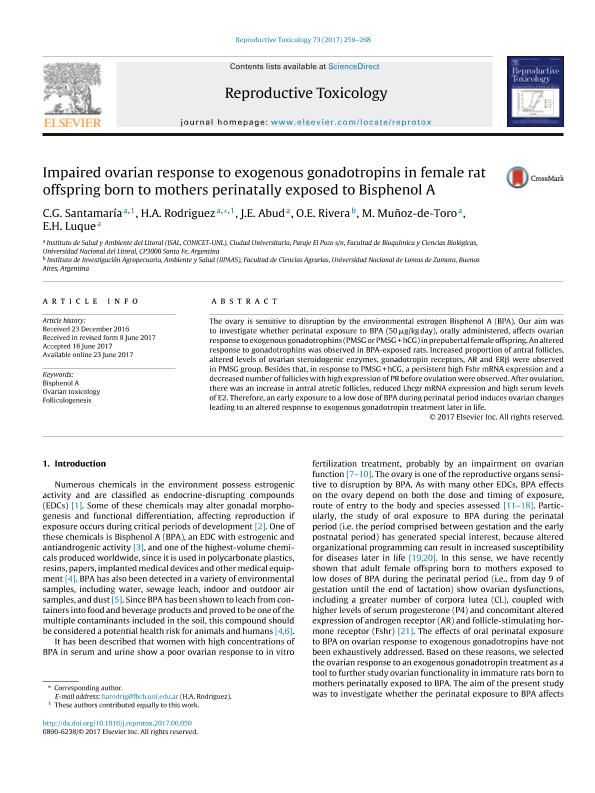Artículo
Impaired ovarian response to exogenous gonadotropins in female rat offspring born to mothers perinatally exposed to Bisphenol A
Santamaría, Clarisa Guillermina ; Rodriguez, Horacio Adolfo
; Rodriguez, Horacio Adolfo ; Abud, Julián Elías
; Abud, Julián Elías ; Rivera, Oscar Edgardo; Muñoz de Toro, Monica Milagros; Luque, Enrique Hugo
; Rivera, Oscar Edgardo; Muñoz de Toro, Monica Milagros; Luque, Enrique Hugo
 ; Rodriguez, Horacio Adolfo
; Rodriguez, Horacio Adolfo ; Abud, Julián Elías
; Abud, Julián Elías ; Rivera, Oscar Edgardo; Muñoz de Toro, Monica Milagros; Luque, Enrique Hugo
; Rivera, Oscar Edgardo; Muñoz de Toro, Monica Milagros; Luque, Enrique Hugo
Fecha de publicación:
10/2017
Editorial:
Pergamon-Elsevier Science Ltd
Revista:
Reproductive Toxicology
ISSN:
0890-6238
Idioma:
Inglés
Tipo de recurso:
Artículo publicado
Clasificación temática:
Resumen
The ovary is sensitive to disruption by the environmental estrogen Bisphenol A (BPA). Our aim was to investigate whether perinatal exposure to BPA (50 μg/kg day), orally administered, affects ovarian response to exogenous gonadotrophins (PMSG or PMSG + hCG) in prepubertal female offspring. An altered response to gonadotrophins was observed in BPA-exposed rats. Increased proportion of antral follicles, altered levels of ovarian steroidogenic enzymes, gonadotropin receptors, AR and ERβ were observed in PMSG group. Besides that, in response to PMSG + hCG, a persistent high Fshr mRNA expression and a decreased number of follicles with high expression of PR before ovulation were observed. After ovulation, there was an increase in antral atretic follicles, reduced Lhcgr mRNA expression and high serum levels of E2. Therefore, an early exposure to a low dose of BPA during perinatal period induces ovarian changes leading to an altered response to exogenous gonadotropin treatment later in life.
Palabras clave:
Bisphenol A
,
Folliculogenesis
,
Ovarian Toxicology
Archivos asociados
Licencia
Identificadores
Colecciones
Articulos(ISAL)
Articulos de INSTITUTO DE SALUD Y AMBIENTE DEL LITORAL
Articulos de INSTITUTO DE SALUD Y AMBIENTE DEL LITORAL
Citación
Santamaría, Clarisa Guillermina; Rodriguez, Horacio Adolfo; Abud, Julián Elías; Rivera, Oscar Edgardo; Muñoz de Toro, Monica Milagros; et al.; Impaired ovarian response to exogenous gonadotropins in female rat offspring born to mothers perinatally exposed to Bisphenol A; Pergamon-Elsevier Science Ltd; Reproductive Toxicology; 73; 10-2017; 259-268
Compartir
Altmétricas



